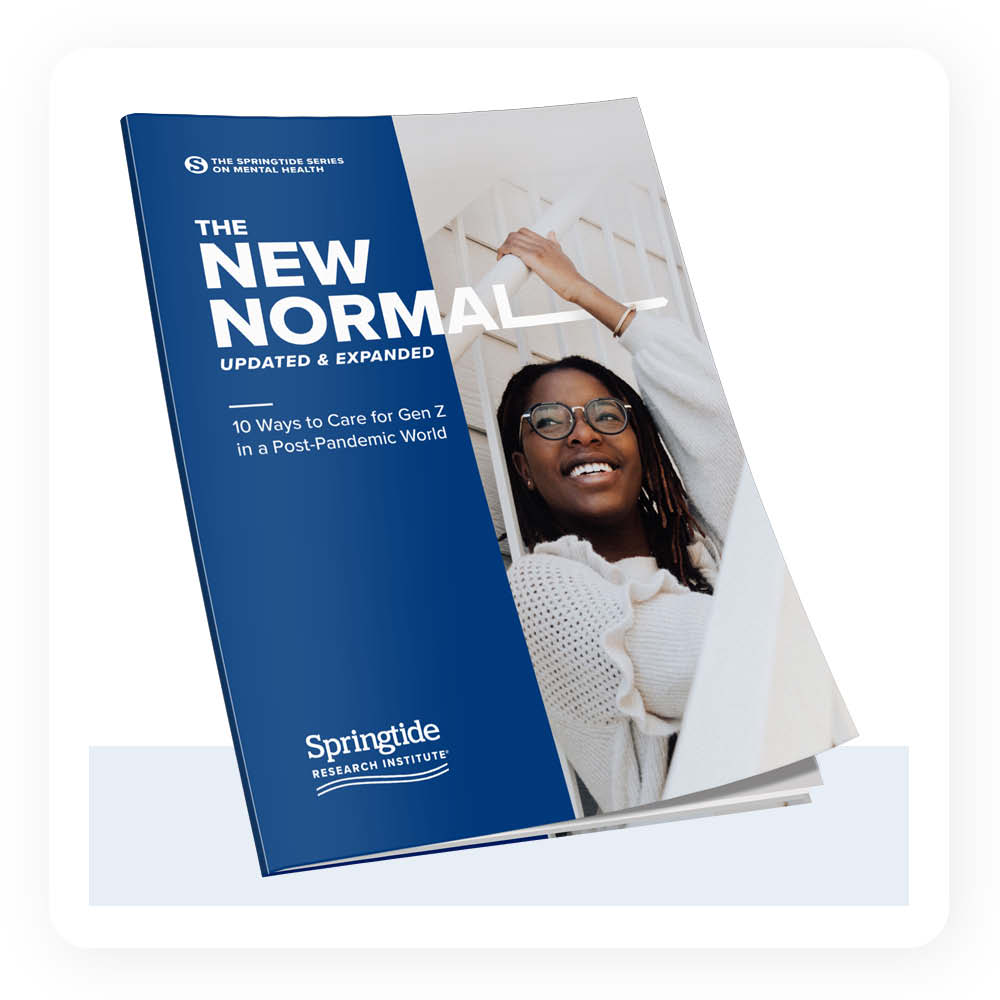Processing the Pandemic; Preparing for Life Post-Pandemic
In March 2020, the first month of lockdown related to the threat of COVID-19 in the United States, Springtide conducted a study of over 500 young people ages 18 to 25, asking about their experiences and expectations about what was to come. In February 2021, a year into living in lockdown, we checked in with young people again, broadening our reach to include ages 13 to 25. The data and insights that emerged from that study were published in our original edition of The New Normal: 8 Ways to Care for Gen Z in a Post-Pandemic World.
In that report, we asked young people about their experiences, how they processed losses and gains, and what they expected from life on the other side of the pandemic. But the other side didn’t come. Even with vaccines becoming widely available in the United States, declines in transmission at the time of publication, and well-known mitigation strategies in place, new variants of COVID-19 emerged; seasons of relative safety continued to fluctuate with seasons of increased risk through 2021 and into 2022.
We have followed up those reports with new research in The New Normal, Updated & Expanded: 10 Ways to Care for Gen Z in a Post-Pandemic World. We have dug deeper into the data, offered insights into the trends impact Gen Z throughout this pandemic, and suggested additional Exercises in Empathy to help trusted adults connect with the young people they care about.
The COVID-19 pandemic will be the most formative and defining aspect of many young people’s lives. While we wish we weren’t writing a report on data entering its third year, we recognize how important it is to continue paying attention to the ways this pandemic is impacting this chapter of young people’s lives—especially when it comes to their mental health.
The New Normal, Updated & Expanded, kicks off the Springtide Series on Mental Health, a topic that we will be exploring in depth over the next year. We will produce reports with actionable insights, host conversations with trusted leaders, launch podcasts with young people, offer resource kits and nationwide activations (and more!) as we look to make space for the mental health concerns of the past years, especially the pandemic’s impact.
We can imagine a post-pandemic world, and maybe in some places we are beginning to live differently than we’ve had to in the past two years. But it will take time, and different populations will emerge from or shed the practices (and fears and protocols) of pandemic living at different paces and in different ways.
For young people between the ages of 13 and 25, it’s not uncommon for every year to be different from the one before; in this sense, there’s really no “normal” to return to after the pandemic. Their world turned upside down just as they were starting to find their footing.
We can begin to imagine that for young people, these years of their lives are not opportunities and events delayed, like an adult returning to a well-known office at a steady job. In many instances, young people are missing entire developmental markers and moments, formative and singular events that in many cases cannot be easily made up for or replaced. And often, these losses are coupled and magnified by a loss of support systems, the kind that would normally help them move forward in times of uncertainty or growth.
In essence, the pandemic has not been a speed bump in their life. It has been a sudden and dramatic left turn.
Caring for young people after these years of grief, trauma, upheaval, and uncertainty is a crucial and delicate calling. But as we enter year three of the pandemic, their mental health is at stake. Religious and faith leaders are part of the hope that’s on the horizon as we begin to consider a post- pandemic world.

You can find data and insights for helping young people process and emerge from the pandemic in our new guide, The New Normal, Updated & Expanded: 10 Ways to Care for Gen Z in a Post-Pandemic World.






